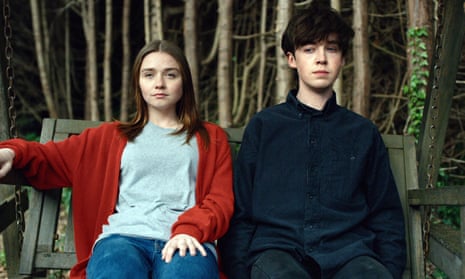It’s hard to decide who is more likable, James or Alyssa, in The End of the F***ing World (Channel 4). No, maybe likable’s not quite right. James thinks he’s a psychopath, and it’s difficult to disagree. At 17, he has already killed a load of animals, ranging in size from butterflies to cats, and he remembers every single one. Now he wants to kill something bigger – someone bigger, in fact. He once put his hand in a deep fat fryer, just to feel something.
Alyssa feels a lot. Sometimes everything feels too much and she has to lie down, “and see the blue or the grey or the black, and I feel myself melting into it, and for, like, a split second I feel free and happy, like a dog or an alien, or a baby”.
Alyssa is better at expressing herself than Jamie is, and he thinks she might be an interesting person to kill. They’re like exaggerated cartoon teenagers. In fact, they are cartoon teenagers and the show is based on a comic of the same name by Charles Forsman, with an extra dimension, and with motion and life breathed in by Alex Lawther and Jessica Barden in the lead roles. It’s fabulous – comedy so dark that you can barely make out the comedy. And yet it is funny, as well as being convincing.
A lot of it is down to the performances from Lawther and Barden. He played the young Alan Turing in The Imitation Game, and is understated and laconic, bordering on catatonic. She was Kayleigh Morton in Corrie until the Mortons moved to Spain, and is teenage angst and rage personified. Together, they are perfect, a double f*** you to their dead-end town. And to the in-crowd, their classmates with their petty interests, worries and mobile phones (Alyssa smashes hers, James never had one). And to their rubbish parents, who have variously left, or died, or remarried horrors, or are just pricks. “I didn’t know where we were going or when I was going to kill her, but I punched my dad in the face and stole his car. And that felt like a good place to start,” says James at the end of the first episode, as he and Alyssa set off in the Mercedes.
Oh, good. I do like a road trip, especially one with attitude and nihilism. Please don’t kill her yet. Actually, I know what happens because it’s all now available on All 4 (which seems to be the norm now) and I binged. Very hard not to when it, and they, are so … yeah, likable.
Benedictine monks, like the ones at Downside monastery in Somerset, don’t take a vow of silence, but certain times of silence are set in the monastic day. There’s not much (any) dialogue in the observational doc Retreat: Meditations from a Monastery (BBC4). And, I’m not going to lie, I did get the giggles a bit. Really? An hour of TV without any talking?
But then I began to get into the vibe. Who needs chat when there are so many other thrills? Highlights include Father Michael waking up, winding up the clock, having breakfast alone and then going to the workshop to sharpen his chisel and carve wood. A red admiral in the garden, an allium being watered, a dripping tap. Father Christopher making bread, in real time …
Hang on, what’s going on inside the abbey? I knew it! The floor is being swept. And excess wax is being pared from the candles … whoa, slow down, I’m not sure I can take any more action.
Actually, a little observation about that clock. The weight is nowhere near the bottom of its drop and I’m not sure it needs winding up. Also, the second hand isn’t moving. Does it even work? No sign of the swinging pendulum, either. Could it be the whole scene was staged for the purpose of television (high) drama – and so that Father Michael’s face could be framed in the circular glass of the open door?
A year on from the dismantling of the refugee encampment on the other side of the Channel, This World: Calais, the End of the Jungle (BBC2) looks back at its final days and at what has happened there since. Mainly from the point of view of the volunteers and charity workers who worked there and what it meant to them. And a little from the French police, and from the lorry drivers trying to avoid extra cargo … Oh, but not from any refugees or migrants. Until right at the end, when there’s a bit from an Eritrean called Aman, who eventually did make it to the UK. But his is the only voice. Which is odd. I guess it is a story, the volunteers’ one. But it’s not the main story.

Comments (…)
Sign in or create your Guardian account to join the discussion